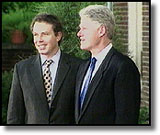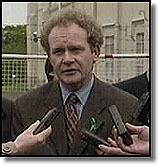
|
Blair Wins US Backing Over UlsterThe Prime Minister has won the backing of President Clinton to ban Sinn Fein from Northern Ireland peace talks, as long as the IRA does not agree to a ceasefire. Mr Clinton and Mr Blair discussed the state of the peace process during a 25-minute meeting at the sidelines of the Denver summit of the world's seven leading industrialised countries and Russia. Mr Blair told the President that Britain had previously promised Sinn Fein it could have a seat at the peace talks, if the IRA observed a written pledge of a six-week ceasefire. According to British officials the IRA response to the initiative was last week's killing of two policemen in an ambush in Lurgan, southwest of Belfast. President Clinton said "the ball is [now] in Sinn Fein's court. We all have to decide. Everybody has decisions to make in life - their decision is: are they going to be part of this peace process or not?" A senior White House official said the US would be following Britain's lead on the Northern Ireland issue, but stressed that the Prime Minister had not asked the President to sever all connections with Sinn Fein. Mr Blair said he was very grateful for the president's private and public expressions of support. Government sources confirmed that the president was very supportive of the approach the Prime Minister and the Irish government had taken. A Government source said: "[Sinn Fein] know full well that the way ahead is an unequivocal ceasefire and adherence to the Mitchell principles." But British officials would not say whether the offer of access to talks still stood should the IRA call a ceasefire.
Mid-Ulster MP Martin McGuinness, Sinn Fein's chief negotiator in recent meetings with British officials, said the scheduled talks between the British government and his party should not have been cancelled. He repeated Sinn Fein's position that demands for a decommissioning of IRA weapons were the "biggest stumbling block to forward movement" towards peace. The chairman of Sinn Fein, Mitchell McLaughlin, told the BBC's Today programme that it would be wrong to exclude a democratic party like Sinn Fein from the peace talks. But Mr McLaughlin refused to condemn the Lurgan killings, calling demands for such a condemnation as a "word game". Andrew Hunter, former Chairman of the Conservative Backbench Committee on Northern Ireland, called the government's offer of talks in exchange for a limited ceasefire "a step backwards". He said it was a concession which the former Prime Minister, John Major, had rejected to make last November. is critical of a "temporary" ceasefire On Friday night, Mr Blair had warned that he was quite prepared to leave Sinn Fein behind unless they help bring about an unequivocal IRA ceasefire. He said: "It has always been the case that there must be an unequivocal cease-fire. And what is important is that, if they are not prepared to do that, if they are not prepared to come into these talks on the basis of the road of peace and democratic methods, when everything has been done to try and make it clear that is something which should happen, if they go ahead and they carry on with their violence, then we have got to build a lasting settlement without them." The Prime Minister had expressed his hope that Monday's killings might bring about a sea-change in the views of long-term Sinn Fein supporters based in the US: "That is what is so important about coming here and building support and saying to the American people: 'Those of you that had some attachment to Sinn Fein realise that any money you give now ends up in policemen being killed in cold blood on the streets of Northern Ireland.'"
Blair Enraged by "Betrayal"Mr Blair is clearly angry at the way in which he believes the IRA have sabotaged a Government initiative which was making progress. A Downing Street spokesman said that Mr Blair would reveal to the Commons on Wednesday what had gone on behind the scenes and was wrecked by the killings in Lurgan. But Mr Blair rejected suggestions that, in his statement to MPs on Wednesday, he would effectively be offering Sinn Fein one more chance. "No, the position is as it has always been. And the decision that they've got to make, the moment of decision if you like, is that they've got to decide that they are going to give up violence and join in the democratic and peaceful path. And, if they don't do that, then there is no future for them within the talks process, and the process which leads to a lasting settlement," he said. |
Diana, Princess of Wales, 1961-1997
Conference 97
Devolution
The Archive
News |
Issues |
Background |
Parties |
Analysis |
TV/Radio/Web
Interactive |
Forum |
Live |
About This Site
News |
Issues |
Background |
Parties |
Analysis |
TV/Radio/Web
Interactive |
Forum |
Live |
About This Site
© BBC 1997 |
politics97@bbc.co.uk |

